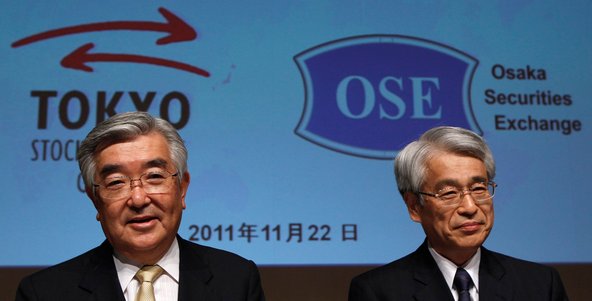The ministers, taking up rules provisionally approved last week by representatives of the European Parliament and member states, broadly agreed on Tuesday to cap bonuses at no more than the annual salary for bankers working in the 27-nation European Union and for those working for European-based banks worldwide. The ministers left the door open for further concessions that could permit some slightly higher bonuses.
The bonus caps, which are subject to formal approval by a majority of member states, among other steps, are aimed at reining in the risky, but potentially high-reward, behavior that contributed to the financial crisis.
British officials and bankers have warned that the limits could make it harder to keep London, Europe’s main financial hub, competitive with financial centers like New York, Singapore and Hong Kong.
During the ministers’ meeting here on Tuesday, George Osborne, the British chancellor of the Exchequer, told his colleagues that the measures could have the “perverse” effect of raising fixed salaries, making it harder to punish bankers for bad investments or ethical lapses by revoking their bonuses.
But facing almost certain defeat on the issue, Mr. Osborne struck a conciliatory tone, saying he would endorse the rules “if we make progress in the next couple of weeks.”
The rules are drafted to apply to a banker working in New York for a British bank like Barclays, and to a banker in London working for an American bank like Citigroup.
A bonus could not be higher unless the bank’s shareholders approved, and even then it could not exceed twice the salary.
British officials, speaking on condition of anonymity because they were not authorized to discuss the issue publicly, said their government would seek to raise the limits on some types of bonuses given in stocks or bonds that would vest in the future. But the legislation was expected to pass in close to its current form.
“It looks like the key points will hold,” said Philip Davies, a partner in London at Eversheds, an international law firm. He predicted that the bonus caps would put London’s financial district, known as the City, at a competitive disadvantage to banking hubs like Wall Street and Hong Kong.
“The long-term effect on the City remains to be seen.” he said. “But as it now stands, alternative jurisdictions that are able to offer more favorable terms look to have a significant recruitment edge.”
Banks are concerned about how the proposed caps would affect them, said several legal specialists who are advising banks based in the City. Some are even seeking legal advice as to whether the European officials are authorized to limit bonuses.
While no bank appears to be ready to take the issue to court, specialists say that will remain a possibility as long as questions about how the bonus caps will work remain unanswered.
When Michel Barnier, the European commissioner responsible for financial regulation, was asked whether he thought any legal challenge would succeed, he replied, “Good luck.”
Some financial institutions are looking at ways to devise compensation packages around long-term incentives that would allow bankers to receive sizable compensation despite any new controls. Yet advisers acknowledge that it would be difficult for leading banks to defend such moves, because of widespread public anger over the industry’s past excesses.
Mr. Osborne’s foes called the European Union’s rebuke a sign that the Conservative government led by Prime Minister David Cameron, which has called a referendum on Britain’s membership in the bloc, was increasingly unable to influence policy making in Europe.
“This government needs to take a crash course in finding friends and influencing E.U. partners,” said Arlene McCarthy, a member of Britain’s Labour Party in the European Parliament and a senior member of the chamber’s Economic and Monetary Affairs Committee.
Ms. McCarthy said she supported the caps as the only way to rein in bankers. But she complained that the Cameron government had failed to win more favorable terms for the City “because of a kind of arrogance” toward its partners in the European Union.
Ireland, which holds the rotating presidency of the bloc, helped broker talks on the bonus caps last week with legislators of the European Parliament. On Tuesday, Michael Noonan, the Irish finance minister, said, “Now there is very little further we can do for” Britain. “We pushed the negotiations to quite a degree, and we got the best possible compromise,” he said.
Mr. Osborne was in a bind over how forcefully to argue for changes. He was under acute pressure from members of the Conservative Party who favor a tough line against European rules that they consider at odds with British interests.
Adding to that pressure was a growing challenge from the United Kingdom Independence Party, which wants to pull Britain out of the European Union.
But supporting high pay for bankers angers significant sections of British voters, who are struggling in a weak economy. Many of them also resent the banking industry for receiving several giant bailouts paid for by taxpayers.
Mr. Osborne also needed to temper his criticism because the caps are part of a legislative package that included something his government favors: tougher rules about how much capital European banks most hold in reserve to protect against losses.
Mark Scott contributed reporting from London.
Article source: http://www.nytimes.com/2013/03/06/business/global/britain-isolated-as-european-colleagues-support-bonus-caps.html?partner=rss&emc=rss
